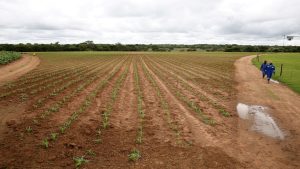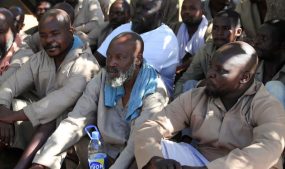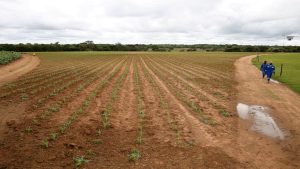It’s a race against time for President Emmerson Mnangagwa to address the economic challenges in Zimbabwe amid rocketing inflation levels.
Zimbabwe’s economy has been on a decline for the past two decades with no immediate end in sight. Runaway inflation reached 175% in June 2019 and is currently projected above 300% according to the International Monetary Fund’s August 2019 figures.
This has led to basic goods and commodities prices rapidly going up on a daily basis. Wages and savings have plummeted. Civil servants and labour unions are threatening nationwide protests.
“I am aware of the pain being experienced by the poor and the marginalized. Fellow compatriots, getting the economy working again from being dead will require time, patience, unity of purpose and perseverance,” says Mnangagwa.
Mnangagwa finally admitting that his country’s economy has all but collapsed in recent months. The country has experienced massive shortages of cash, foreign currency, electricity, fuel, water and basic food.
There are also mass drug shortages in public health institutions. The country’s doctors have been embarking on industrial action since beginning of September. They vowed not to return to work until government addressed their living and working conditions.
Doctors even defied a government ultimatum to return back to work on Monday.
Economic analyst Takunda Mugaga says, “Zimbabwe is going through a hard patch in terms of the economy, it’s a case of kicking the can down the road whilst at the same time the end in terms of the problem. It’s not yet clear when we are going to escape the challenges but if one is to ask what is driving the economic challenges we have right now, it could be more to do with the after effects of a hastily introduced local currency. The lack of confidence in that currency is what is somehow spiralling into runaway inflation where you see most of the commodities are beyond the reach of an ordinary citizen in Zimbabwe.”
Religious groups believe the country needs to heal from its troubled and violent past and that politicians are at the forefront of its challenges. They are proposing a radical shift.
Secretary General of Zimbabwe council of churches Rev Kenneth Mtata says, “In light of the current political paralysis, deepening mistrust and dehumanising economic decline, the nation will need to take a bold decision to address the root causes of our national challenges that have a very long history and will not be fully resolved by one entity. In this light, we are calling on the nation to sabbath on all political contestation for seven years to allow for the rebuilding of trust and confidence, reset our politics and chart a shared way forward towards a comprehensive economic recovery path in a non-competitive political environment.”
The call by the churches has been met with mixed reaction. Analysts believe just attending to this one area, is not in the best interest of the nation.
“It is important to have an understanding of institutions which are weaker at the moment, look at the corruption levels in the country, quite very high, look at the poverty levels, and look at the issues like money supply growth which could be spearheaded by some of the institutions in the country. The solution lies in establishing stronger, credible and sustainable institutions, which are driving the economy. Secondly, yes the political friction between the two major parties is becoming a liability by day especially to the ordinary citizen in Zimbabwe as they have to grapple with negativity, the news which will not take the nation forward and I don’t think the solution lies in extending the election period forward. There is a constitution in the country and I think for any democracy to survive there is need for constitutionalism and it also embraces adhering to the constitutional requirement of having elections every 5 years,” says Mugaga.
As the country eagerly awaits the next move by political leaders, Zimbabweans have to grapple with daily price increases of goods and services and a worsening economic and social environment.
Watch video below






